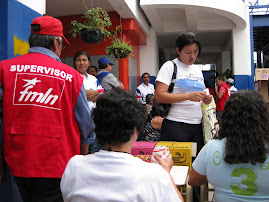Others taking part in the delegation were Karen Volkhausen of Bangor, Maine/Carasque; Joan Laurion of Madison, Wisconsin/Arcatao; and Libby Pappalardo of Crystal Lake, Illinois/Chilama. Although Meredith DeFrancesco, of Maine radio station WERU, wasn't an official part of this delegation, we did meet with the staff of Radio Sumpul which is sistered with WERU. The main goals of this delegation were to learn what the various cooperatives in our sister communities are doing and ways in which we might help them market their products.
In Carasque and in Arcatao we met with the community councils and representatives of various cooperatives in those communities. Most of the cooperatives make items for sale in the U.S., Spain, and other countries as well as in El Salvador. The cooperatives are formed around a particular interest or art form such as sewing and embroidery, crochet, jewelry, wood crafts and music. Both men and women are members of these coops.
One women's cooperative in Carasque is especially interesting. With the assistance of Oxfam, the women began a savings and loan group. Each person in the group of 12-20 saves $2.00 per month. This may seem like a small amount, but when you consider that the average wage in El Salvador is $150 per month and many earn much less, it is a considerable amount. The group meets monthly, and anyone who is late for a meeting must pay a fine. The group not only saves money; they also grant loans with 1% interest. The idea for this came from a desire to own a business but lacking money to start. The community decided it would be better to form their own bank than to go outside the community.
Chilama has been part of Sister Cities for a much shorter time than Carasque and Arcatao. As a result, they lack the infrasturcture of those two communities. However, they have cooperated in a seed/road building project. After receiving $2,000 to purchase seeds from their Sister City, Friends of Chilama, in McHenry County, Illinois, the community decided to give money for seeds and fertilizer to those who worked on building a road from the top of the mountain to their community by the river. Those who were unable to work on the road because of age or ill-health would be given a portion of the crop. The crops were planted and harvested, the road is almost completed, and everyone has beans and corn to eat this year.
Both Carasque and Arcatao have received considerable financial aid from the governments of Spain and Canada. Wouldn't it be wonderful if the United States funded development projects in these and other very rural communities rather than a highway across northern El Salvador which benefits only the maquillas, which treat their employees as slaves, and the mining companies, which destroy the environment?



























No comments:
Post a Comment